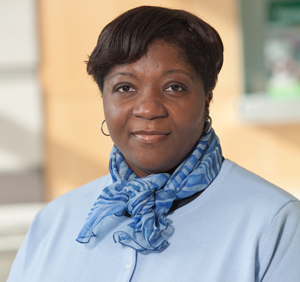The Diversity and Inclusion Office featured the second of a three-part speaker series on Tuesday, Oct. 25, about the Diversity Engagement Survey developed by UMass Chan Medical School in collaboration with the Association of American Medical Colleges to measure academic medical center diversity engagement and inclusion. The event, “Conversations in Designing and Implementing Data Informed Strategic Plans and Accountability Measures,” included a panel of diversity and inclusion professionals from across the country who spoke about their experiences using the Diversity Engagement Survey within their medical institutions to inform and impact change.

The Diversity Engagement Survey, published in 2015 in Academic Medicine, the journal of the Association of American Medical Colleges, is a tool that provides institutions with data on the level of active engagement by their members, their inclusive characteristics and the degree to which their diverse groups experience inclusion.
“The goal of this conversation is really to build a community of practice to share challenges and success stories on how we use data to inform our conversations and practices at our individual institutions,” said Marlina Duncan, EdD, vice chancellor for diversity and inclusion.
Panelists included Mona Fouad, MD, MPH, professor of medicine, senior associate dean for diversity and inclusion and director of preventive medicine at the University of Alabama at Birmingham; Harolyn Belcher, MD, MHS, professor of pediatrics at Johns Hopkins University School of Medicine and vice president and chief diversity officer at Kennedy Krieger Institute; and Jaya Aysola, MD, MPH, associate professor of medicine and pediatrics and assistant dean of inclusion and diversity at the Perelman School of Medicine at the University of Pennsylvania. They shared the unique ways in which they used the Diversity Engagement Survey, such as to test the perception of diversity and inclusion at their institutions; to create a strategic plan around findings; to look at and make revisions to mission and vision statements and ultimately expand and create more inclusive programming; and to improve institutional cultural competency practices.
“For our strategic plan to get buy in from our leadership, we needed to tell them what we found,” said Dr. Fouad, who saw a discrepancy in the perception of diversity, equity and inclusion between leadership and faculty at her institution.
Making senior leadership aware of the dissatisfaction of faculty around diversity and inclusion practices led to the creation of departmental strategic plans with benchmarks to monitor improvements at her institution, she said.
“We didn't want efforts of equity or inclusion to be siloed activities that are sort of relegated to one office or champion,” said Dr. Aysola, whose institution used the survey to assess organizational readiness to embark on a five-year institutional strategic plan. “We wanted the culture to be that we saw them as integral to the daily operations and functioning of any well-functioning organization. And so, to do that we needed to figure out ways in which inclusion intersected with things that they already prioritized like professionalism and wellness, and this is how we baked practice and initiatives into the strategic planning.”
Panelists also shared their strategies for implementing the Diversity Engagement Survey, which included having leadership allies who bought into the plan encourage others to see the value in it and including members of an institution such as custodial staff and food prep workers, who are not always seen or heard.
“Just being able to connect with the variety of all our workforce and to let them know they are important, is key,” said Dr. Belcher.
Barriers and the loss of anonymity are also a reality when getting an institution ready for the survey. “Fear of retaliation and the lack of clarity about where survey responses would go were important to clarify when preparing people for the survey,” said Aysola.
Sharina Person, PhD, the Dr. Marcellette G. Williams Senior Scholar and vice chair and professor of population & quantitative health sciences, who was instrumental in the creation of the Diversity Engagement Survey, encouraged attendees to not be discouraged by response rates, which are typically around 30 percent. In addition, panelists suggested that with proper coordination, instructing departments administering their own surveys and doing their own strategic planning in addition to institution-wide efforts, can help increase the sense of importance of these efforts.
The third installment of the Diversity Engagement Speaker Series, “The Diversity Engagement Survey and You,” on Jan. 17, 2023, will explore the survey’s use at UMass Chan and how it can be used to drive change.
Related UMass Chan news stories:
UMMS faculty recognized as Dr. Marcellette G. Williams Distinguished Scholars
UMMS, AAMC develop tool to measure diversity, inclusion in academic medicine